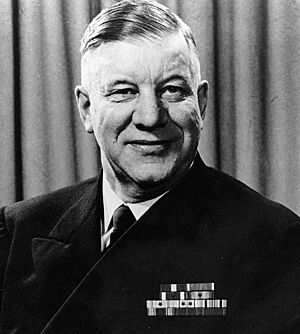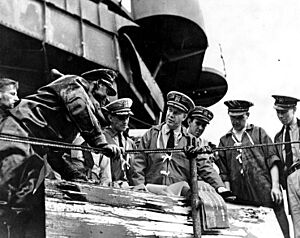Homer N. Wallin facts for kids
Quick facts for kids
Homer Norman Wallin
|
|
|---|---|

Vice Admiral Homer Norman Wallin
|
|
| Born | December 6, 1893 Washburn, North Dakota |
| Died | March 6, 1984 (aged 90) |
| Allegiance | |
| Service/ |
|
| Years of service | 1917–1955 |
| Rank | |
| Battles/wars | World War I World War II Cold War |
| Awards | Navy Distinguished Service Medal Legion of Merit Navy Commendation Medal (2) |
Homer Norman Wallin (born December 6, 1893, died March 6, 1984) was a brave and important leader in the United States Navy. He is most famous for helping to raise and fix ships that were sunk during the attack on Pearl Harbor. He became a vice admiral, which is a very high rank in the Navy.
Contents
Homer Wallin was born in Washburn, North Dakota. After a short time at the University of North Dakota and serving in the state National Guard, he joined the U.S. Naval Academy in 1913. He finished his studies in March 1917. He then became an Ensign, a junior officer in the Navy.
Service During World War I
During most of World War I, Wallin worked on the battleship New Jersey (BB-16). In September 1918, he joined the Navy's Construction Corps. This meant he would focus on building and repairing ships. He went to the Massachusetts Institute of Technology to study naval architecture. This is the science of designing and building ships.
Building a Career in Ship Design
After earning his Master of Science degree in 1921, Wallin worked at the New York Navy Yard for four years. From 1925 to 1929, he was assigned to the Bureau of Construction and Repair in Washington, D.C.. This office was in charge of Navy ship construction.
Over the next ten years, he worked at the Mare Island Navy Yard and Philadelphia Navy Yard. He also returned to the Bureau of Construction and Repair, which later became the Bureau of Ships in 1940. During this time, Wallin married Elizabeth and they had two children, Homer Norman, Jr. and Susan Ann.
World War II and Pearl Harbor Salvage
In 1941, Captain Wallin became an important officer for the U.S. Pacific Fleet. He was in this role when Japan attacked Pearl Harbor on December 7, 1941. This surprise attack severely damaged many U.S. Navy ships.
Leading the Salvage Effort
Early in 1942, Captain Wallin was put in charge of the Salvage Division at the Pearl Harbor Navy Yard. His job was to direct the huge effort to recover and repair the sunken ships. This was a massive and difficult task.
Through most of 1942, he led this important work. His team successfully recovered three battleships that had been sunk. This was a major achievement that helped the Navy get its ships back into service.
Later War Assignments
From November 1942 to August 1943, he was a maintenance officer for the South Pacific Force. After that, he spent a few months at the Bureau of Ships. In October 1943, Rear Admiral Wallin became the supervisor of shipbuilding in Seattle. He also commanded the naval station at Tacoma, Washington.
After World War II
After World War II, Wallin continued his important work. He commanded the Philadelphia Naval Shipyard and the Norfolk Naval Shipyard.
Leading the Bureau of Ships
In February 1951, he became the chief of the Bureau of Ships. This was a very important position where he oversaw all Navy ship design and construction. He held this role until August 1953.
USS Missouri Grounding
Because of his great experience at Pearl Harbor, Wallin was chosen to lead another big salvage effort. This was in 1950, when the USS Missouri ran aground. He successfully directed the operation to free the battleship.
Retirement and Legacy
Wallin took command of the Puget Sound Naval Shipyard in August 1953. He retired from active service on May 1, 1955. At the same time, he was promoted to the rank of vice admiral because of his awards for bravery.
In 1968, Vice Admiral Wallin wrote a book about his time in the Navy. It was called Pearl Harbor: Why, How, Fleet Salvage and Final Appraisal. The book focused on his work during the Pearl Harbor salvage operations.
Vice Admiral Homer N. Wallin passed away on March 6, 1984. He is buried at Willamette National Cemetery in Portland, Oregon.
Images for kids
 | Roy Wilkins |
 | John Lewis |
 | Linda Carol Brown |



